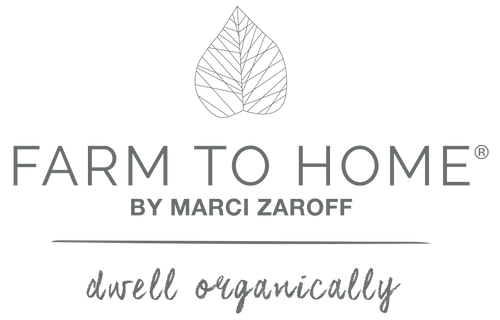This Mother's Day, we've spent some time with our founder, Marci Zaroff. She is a mother to two organically-raised Millennials, not to mention the mother to multiple sustainable brands. She birthed the term "ECOfashion" in 1995 and has been revolutionizing fashion and textiles ever since. We hope you enjoy our Q & A with her. Happy Mother's Day!
This Mother's Day, we've spent some time with our founder, Marci Zaroff. She is a mother to two organically-raised Millennials, not to mention the mother to multiple sustainable brands. She birthed the term "ECOfashion" in 1995 and has been revolutionizing fashion and textiles ever since. We hope you enjoy our Q & A with her. Happy Mother's Day!
How did you get to where you are now? What inspired you to begin Farm to Home?
My career started in holistic health and wellness. After I graduated from UC Berkeley Haas Business School in 1989, I moved to New York, and co-founded an educational center called “Gulliver’s Living & Learning Center,” now known as the Institute for Integrative Nutrition.
One day one of my clients asked me about organic fashion and I had an “A-ha!” moment. Fashion was the missing link in the wellness equation. I began researching the impacts of conventional fiber agriculture and textile production and realized what an opportunity there was to problem-solve. I coined and trademarked “ECOfashion” and founded my first organic apparel and home brand, Under the Canopy.
Fast forward to today: Farm to Home grew from a desire to bring organic, beautiful, high quality, and affordable bedding and bath collections to the mainstream. I had spent years building sustainable supply chains from the ground up in India. As a key figure in developing and defining the Global Organic Textile Standard (GOTS), I knew we had to be able to trace the cotton all the way back to the farm. Knowing that our organic cotton is traceable from the seed on the farm all the way to the bedrooms and bathrooms of your homes is what I’ve tried to capture in our brand’s name.
How have you seen the sustainability movement grow throughout your career?
I feel like a little kid in a candy store now. When I started in the organic textiles business, I had no one to turn to – I had no farms, fabrics, factories or retailers. People think it’s hard now – three decades ago, it didn’t exist! I had to create it. One of my favorite quotes is from Jonathan Swift, “Vision is the art of seeing things invisible.” Everything we see around us is created from ideas turned to realities.
One example is in the organic farm projects I’ve been a part of. Collaborating with farmers in learning, evolving, and cultivating seeds of potential has led to incredibly rewarding developments in regenerative organic farming practices. This positive progress has truly changed the lives of those growing and sewing our products.
The digital revolution has accelerated our efforts. Over a very short period, consumers moved from viewing organic as an elitist marketing ploy to a no-brainer. Currently, 84% of households are buying organic at least some of the time. It feels good to know I’ve helped drive organic’s shift from the alternative to the norm.

Why should we care about organic on a global level?
Organic is a long-term solution on many levels. Regenerative organic agriculture can actually rebuild soil, save water, reverse climate change and enhance the lives of some of the most vulnerable global workers. It’s the ultimate win-win-win.
Why is the home a good place to start going organic in terms of textiles?
We spend 1/3 of our lives asleep. Our skin is our largest single organ and primary organ for absorption. A conventional cotton sheet or pillow case is riddled with toxic fertilizers and pesticides from the agricultural product itself, not to mention chlorine bleach, formaldehyde, heavy metals, and all the other harmful chemicals that are potentially added in the dyeing, finishing and processing of a cotton textile.
Sleep is an opportunity for the body, on a cellular level, to restore itself for a new day ahead. By exposing our skin to certified organic products in bed and in our homes, we are offering our bodies and minds purity in that restoration.
Because switching to organic home products is easy, it’s a great place to start if you’re not already supporting organic agriculture in your life. It doesn’t require changing daily habits or rituals. And with organic bedding and bath more affordable than ever, there’s nothing to hold you back!
On that note, how do you keep the Farm to Home prices so accessible?
I believe that everyone should be able to #dwellorganically. No one should have to compromise on style, quality, color, comfort, sustainability OR price. There is a stigma that sustainability means that we have to give something up—Farm to Home is here to prove that idea wrong.
We have streamlined supply chains that reduce the number of transactions between the farmer and the consumer. We pass that savings onto our customers because we know that the more people that buy organic, the more potential we have for positive impact on the world.
What are some actions our readers can take immediately?
Vote with your dollars and buy organic food, apparel, home and beauty products. Keep learning. Follow me @marcizaroff to keep your finger on the pulse of organic and consider reading my book, ECOreniassance. Share what you learn with your circle of friends and family. We all have the power to create a ripple of change.
Thank you so much for sharing your journey with us, Marci. Happy Mother's Day to you and our readers. For more wellness and organic lifestyle inspiration, follow us on social at @farmtohomeorganic.

